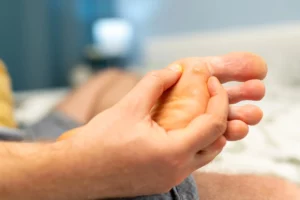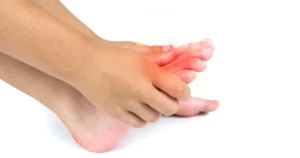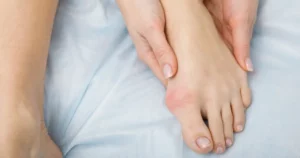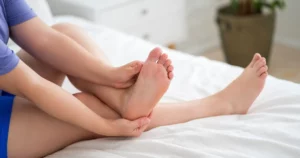Table of Contents
Bunions, corns, and calluses can lead to discomfort and hinder your mobility. These prevalent foot conditions stem from various factors, including genetics, footwear choices, and everyday activities. At Integrity Foot And Ankle Associates, we offer a distinctive wellness experience for those seeking relief. Ignoring these symptoms can result in worsening pain and complications over time. Early recognition and exploration of effective treatment options are vital for maintaining foot health. Practical solutions are at hand, whether you’re grappling with a painful bunion or the irritation of corns and calluses.
Understanding Bunions
What Are Bunions?
Hallux valgus, or bunions, are bony protrusions at the base of the big toe. Big toe joints stick out when they push against adjacent toes. Bunions can be hereditary, but inappropriate footwear and specific foot structures can exacerbate their development.
Symptoms of Bunions
In addition to a noticeable bump on the side of the big toe, bunions often present with pain, swelling, redness around the joint, and limited mobility. Calluses or corns may sometimes develop where the toe rubs against other toes. These symptoms can vary in severity, but neglecting them can result in long-term discomfort and complications.
Treatment Options for Bunions
- Non-Surgical Treatments: Non-surgical treatments for bunions include using custom orthotics to realign the foot and evenly distribute pressure, which helps reduce pain and discomfort. Padding and taping can cushion the bunion and hold the toe more naturally. In contrast, footwear modifications, such as wearing shoes with a broader toe box and avoiding high heels, can alleviate pressure. Over-the-counter anti-inflammatory medications may also reduce pain and swelling, and physical therapy exercises to strengthen the foot and improve flexibility can help manage symptoms effectively.
- Surgical Options: Surgical intervention may be necessary if conservative treatments fail to provide relief. A bunionectomy is the most common surgical procedure for bunions. This surgery involves realigning the big toe and removing the bony growth. Recovery can take several weeks, but many patients report significant pain relief and improved foot function after surgery.
Exploring Corns
What Are Corns?
When repeated friction or pressure causes the skin to thicken, corns form. They commonly form on the tops or sides of toes and can be painful. Unlike calluses, which can occur on various parts of the foot, corns are typically smaller and more localized.
Symptoms of Corns
Common symptoms of corns include a small, raised bump on the skin, often with a hard center, accompanied by pain or tenderness when touched. Joint discomfort is also common, especially when wearing tight or ill-fitting shoes.
Treatment Options for Corns
- At-Home Remedies: At-home remedies for corns include soaking your feet in warm water and moisturizing regularly to soften the corns, making them easier to manage. Over-the-counter treatments, such as corn pads and medicated products, can help relieve pain and remove corn. Switching shoes with a wider fit can reduce pressure on the affected area.
- Professional Treatments: If at-home remedies do not work, a visit to a podiatrist is recommended. They can safely remove corn and guide on preventing future occurrences. Your podiatrist may recommend orthotics or modifications to your footwear to alleviate pressure.
Understanding Calluses
What Are Calluses?
Calluses develop when repeated pressure or friction is applied to the skin. They usually form on the soles of the feet or the palms of the hands and act as a protective barrier. While calluses are generally harmless, they can become uncomfortable if they grow too thick.
Symptoms of Calluses
Calluses commonly include thick, rough skin in specific areas, often
on the soles or heels, accompanied by tenderness or discomfort when applying pressure. The skin surrounding the callus may also appear dry or flaky.
Treatment Options for Calluses
- Preventive Measures: Preventive measures for calluses include wearing shoes that provide proper support to alleviate pressure on the feet and maintaining good foot hygiene by regularly washing and moisturizing to keep the skin soft and prevent thickening.
- Treatment Approaches: Treatment approaches for calluses include regular foot exfoliation to reduce thickness and moisturizing treatments using creams or ointments designed to soften and minimize calluses. For persistent or painful calluses, visiting a podiatrist for professional removal and personalized advice may be necessary.
Importance of Foot Health
Maintaining the health of your feet is essential not only for mobility but also for your overall quality of life. Foot problems can lead to discomfort, limited mobility, and complications that may affect other body parts. For instance, issues with your feet can lead to changes in gait, which may result in knee, hip, or back pain over time.
The Role of Footwear in Foot Health
Improper footwear significantly contributes to foot problems, as shoes that are too tight lack support, or have high heels can worsen conditions like bunions, corns, and calluses. Choosing shoes that fit correctly is vital to prevent these issues, providing enough room for your toes to move comfortably. Look for footwear with adequate arch support and cushioning to absorb shock, made from breathable materials to keep your feet dry and comfortable. Opt for low-heeled or flat shoes to reduce pressure on the forefoot.
Lifestyle Changes for Better Foot Health
In addition to wearing proper footwear, lifestyle changes can help maintain healthy feet. Regularly inspecting your feet for any issues and keeping them clean and moisturized can prevent dryness and problems. Nutrition rich in vitamins and minerals enhances circulation and strengthens foot muscles. Foot problems can also be reduced by maintaining a healthy weight.
Consult a Professional
Your feet are your foundation, supporting you through every step of your day. Bunions, Corn, and Calluses are common foot conditions that significantly impacting your comfort and mobility. Fortunately, various treatment options are available, from simple lifestyle changes to professional medical interventions. Consulting with a board-qualified surgeon will guide you toward the best foot treatment option.
Takeaway
Taking care of your feet is essential for maintaining overall health and well-being. Bunions, corns, and calluses can cause discomfort and hinder mobility, but effective treatment options are available. Don’t let these common foot conditions disrupt your daily life any longer. Our Integrity Foot And Ankle Associates team is here to help you find solutions tailored to your needs. Schedule your foot care consultation now to regain comfort and confidence in your steps. Your feet deserve the best care. Contact us today and take the first step toward healthier, happier feet!





